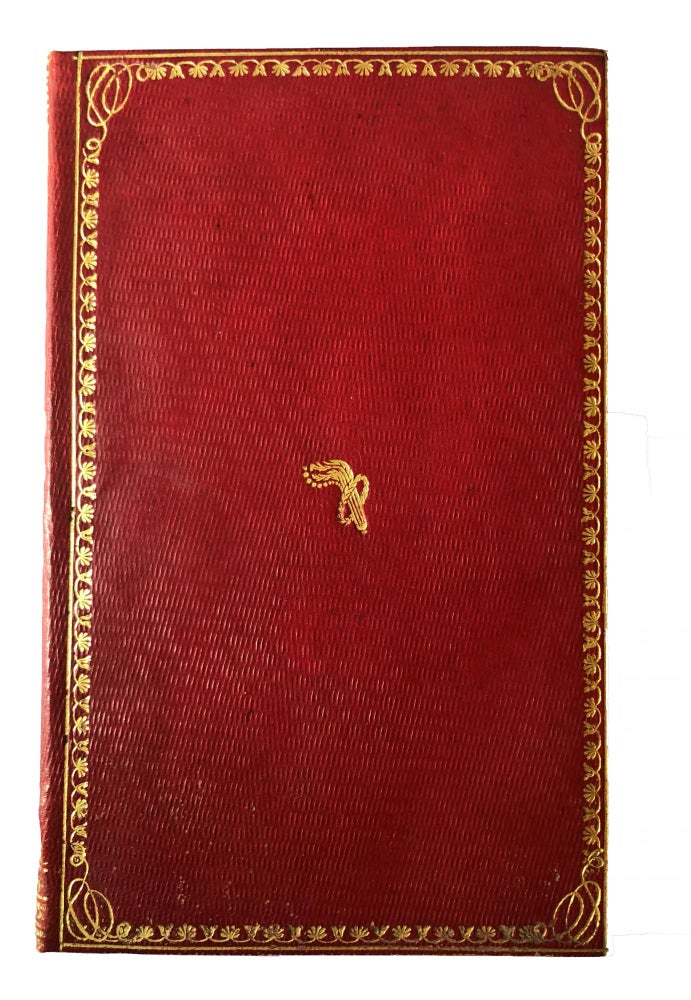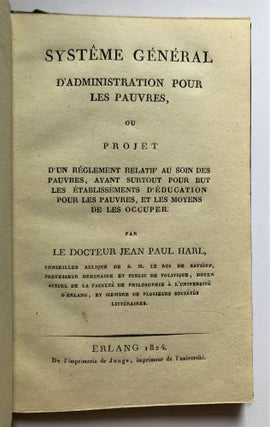Systême général d'administration pour les pauvres, ou projet d'un réglement relatif au soin des pauvres. Erlangen: Junge, printer to the University, [1824].
8vo (193 x 122 mm). [2], 47 pages. A fine copy on heavy wove paper, bound in contemporary crimson morocco-grained boards, covers gold-tooled with central torch and wreath ornament and floral acanthus roll border, blue endpapers, edges delicately mottled and gilt (very slight scuffing to front cover). Paper label inside lower cover with number 515.***
First edition, printed for private circulation, of a rather sinister proposal to alleviate poverty by creating work houses and free education for children of the (deserving) poor, while simultaneously benefiting Germany’s textile industry. Professor of political economy and administration at Erlangen, Harl enjoyed the patronage of Maximilian Joseph, Count von Montgelas, prime minister of the Bavarian court, and a rationalist, secularist promoter of absolute monarchy. Harl wrote prolifically, published the journal Cameral-Correspondent from 1805 to 1812, and, thanks to Montgelas, even obtained the cross of the Legion of Honor. After the latter’s dismissal in 1817, Harl’s cameralist views became discredited. “His contemporaries judged him harshly ... [Moritz von] Mohl called his principal writings “of bottomless uselessness” ("von bodenloser Unbrauchbarkeit," ADB). Harl sank into obscurity and committed suicide in 1842.
In the first chapter, Harl attempts to distinguish the deserving poor, who because of age, infirmity, or catastrophe truly cannot provide for themselves, from the lazy masses, who shirk work and live off the public dole. In Chapter II these undeserving poor are more closely identified with those who beg. To extirpate this evil the giving of alms to beggars should be outlawed. A more concrete recommendation, and the heart of Harl’s proposal, is the establishment of work houses, for those who cannot find work elsewhere (his sole acknowledgement of possible economic causes of poverty). If poor youth learn the joys of work, they will be inspired to change their state. Chapter III advocates the establishment of free schools for the children of the Good Poor, who by the age of six can also start working, in spinning or other textile-related tasks. In Chapter IV the work houses or “establishments of voluntary occupation” are described in more detail: unlike the “odious and dreaded” houses of forced labor, they are to be strictly voluntary. Besides offering employment they will provide some training, in spinning, of linen, hemp, and wool, and occasionally knitting. Indeed, the key to Harl’s proposal lurks at the end of Article 45, p.44: “It is in poor houses that one can most advantageously produce this kind of work [textile preparation], which is globally necessary and which at present we are obliged to have done in foreign lands.” Finally, the establishments would be essentially non-profit: the profit and benefit to the state will be reaped by the stimulus to the economy and reduction of the numbers of those living in poverty.
Presented in numbered articles, with typographic distinctions of the most important points, the neat paragraphs thinly disguise Harl’s sometimes fuzzy analysis. But his treatise points to the pervasiveness of poverty in Europe on the eve of the industrial revolution, and the growing concern among political theorists for the social menace presented by the poor, though not for the people themselves.
Harl wrote the treatise in German, and an unnamed French friend translated it into French, as stated in the preface to the 1837 reprint of the text, which also provides the date of this edition and explains that it circulated privately for presentation only, to “sovereigns, princes, and ministers” (p. xi). The German text (Entwurf eines rationellen und allgemeinen Armen-Versorgungs-Systems) was published in 1825.
OCLC lists 2 copies of this edition in the US (Penn and U. Chicago, acquired from us), and two copies of the more common 1825 German edition (Harvard Business and Yale). On Harl, see Allgemeine Deutsche Biographie 10 (1879), 601-602. Item #4139
Price: $1,750.00


